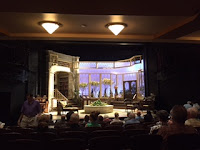In the spirit of trying to write about things when they're fresh in my mind, I'd like to talk briefly about a play I saw this evening. Tonight I was in the audience for the play Misalliance at the Shakespeare Theater of New Jersey. Misalliance is a drawing room comedy written by George Bernard Shaw in the first decade of the 20th century. Unlike other Shaw plays, this one isn't particularly well known and apparently doesn't see the stage often these days. Reviews for this particular production were rather mixed, and I think I get why that is.
Misalliance is a play that seems to take a while to get started, but even after it did take off some, I still found myself a little puzzled as to what exactly the plot was. There just simply isn't much of a plot. The entire play takes place in one evening in one setting - the pavilion room of a wealthy businessman in the English countryside. The characters consist of a family of four as well as the daughter's fiancée and his father, and a few unexpected guests. Some of the themes explored include the parent-child relationship, education, the class system, speech versus action, politics, and feminism. While this is all well and good, there times here and there where the play was very speech-y and it was unclear what this all was leading to -- sometimes, it would loop back around to the general themes and flow of the play while other times it would just be there to be there. It also seemed like the characters were sometimes a bit contradictory in all their long-windedness.
On the plus side, there were definitely a lot of humorous parts to the play, which is what I was hoping for and expecting. Shaw makes more than a few meta-references to plays and all their trappings that had good tongue-in-cheek quality to them. The father's penchant for pushing books at everyone was a hilarious refrain in particular. After a plane crashes in the garden outside, things got a bit farcical, but that was in a good way. The introduction of Lina, the Polish acrobat, was refreshingly funny and added some physical comedy to the play. She also elicited a lot of laughs either through her own person or through the minor plot points she put into action. In addition, Lina brought home more of the feminist theme, with a rousing speech that was the only one to elicit applause from the audience mid-scene:
Oh, your Johnny! with his marriage. He will do the straight thing by me. He will give me a home, a position. He tells me I must know that my present position is not one for a nice woman. This to me, Lina Szczepanowska! I am an honest woman. I earn my living. I am a free woman. I live in my own house. I am a woman of the world. I have thousands of friends. Every night crowds of people applaud me, delight in me, buy my picture, pay hard-earned money to see me. I am strong. I am skillful. I am brave. I am independent. I am unbought. I am all that a woman ought to be; and in my family there has not been a single drunkard for four generations. And this Englishman! this linendraper! he dares to ask me to come and live with him in this rrrrrrrabbit hutch, and take my bread from his hand, and ask him for pocket money, and wear soft clothes, and be his woman! his wife! Sooner than that, I would stoop to the lowest depths of my profession. I would stuff lions with food and pretend to tame them. I would deceive honest people's eyes with conjuring tricks instead of real feats of strength and skill. I would be a clown and set bad examples of conduct to little children. I would sink yet lower and be an actress or an opera singer, imperiling my soul by the wicked lie of pretending to be somebody else. All this I would do sooner than take my bread from the hand of a man and make him the master of my body and soul. And so you may tell your Johnny to buy an Englishwoman: he shall not buy Lina Szczepanowska; and I will not stay in the house where such dishonor is offered me.
Similar sentiments are expressed by the 20-something daughter of the family, Hypatia, who feels trapped in her upper middle-class life:
- "I don't want to be good; and I don't want to be bad. I just don't want to be bothered about either good or bad. I want to be an active verb."
- "I want to be; I want to do; and I'm game to suffer if it costs that. But stick here doing nothing but being good and nice and ladylike I simply won't."
- "Men like conventions because men made them. I didn't make them. I don't like them. I won't keep them."
Of course, the feminist in me identified with a lot of this (but not necessarily with the way Hypatia went about her search for adventure ... although given the time period and her social situation, she really didn't have a ton of options available to her). So that specific theme as well as the humor really appealed to me. This particular production also had an absolutely beautiful and elaborately detailed set (see pictures above), excellent actors who were well cast, attractive costumes, and a lovely intimate setting in the relatively small theater. While there were some speeches that did drag and seemed a little pointless, overall I'm glad to have seen this play. Tomorrow is the last two showings of this production, so run - don't walk - to the box office to grab your tickets!



No comments:
Post a Comment